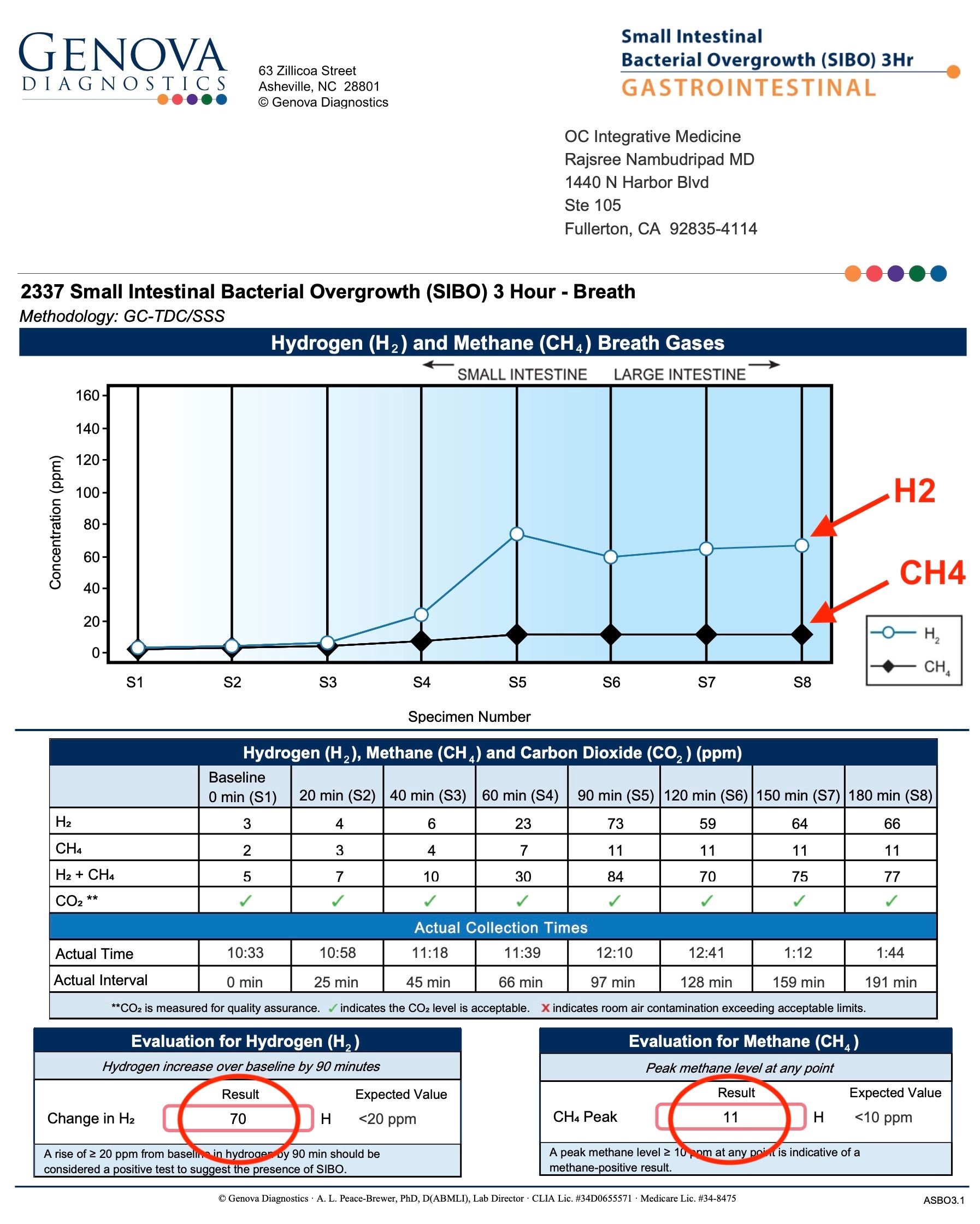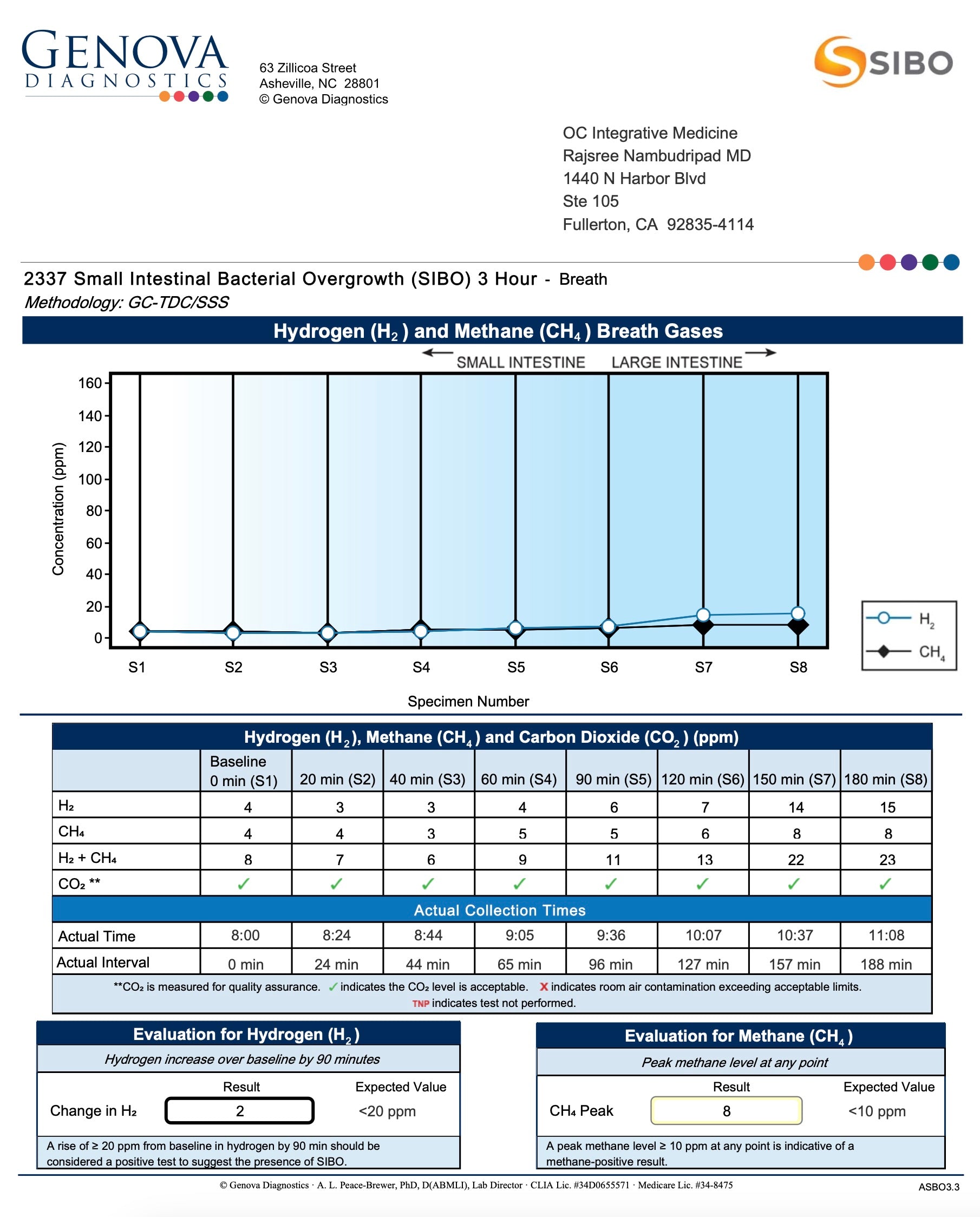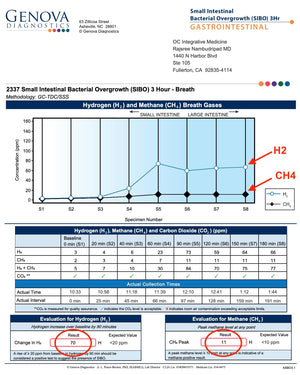Patient Background
This is the case of a 54-year-old woman who presented with persistent bloating, food sensitivities, and fluctuating bowel habits since an episode of food poisoning in 2018. Despite numerous dietary restrictions, she continued to experience bloating daily and was highly reactive to a growing number of foods.
Her bowels alternated between constipation and diarrhea, and she avoided a wide range of foods that triggered symptoms, including:
- Cruciferous vegetables (e.g., broccoli)
- Legumes, whole grains, and soybeans
- Dried fruits, cherries, fruit juices
- Higher-fructose sweeteners (honey, agave, molasses)
- Sugar alcohols and artificial sweeteners
Prior testing for Celiac disease and H. pylori had been negative.
Relevant Medical History
- Breast Cancer (HR-negative, HER2-positive) at age 36, treated with bilateral mastectomy, chemotherapy, radiation, and Herceptin
- Thyroid Cancer diagnosed incidentally via PET scan at age 36, treated with total thyroidectomy and radioactive iodine ablation
- Melanoma in her 20s
- Atrial fibrillation (Afib), stable
Despite multiple cancer diagnoses and treatments, she was highly motivated and committed to her health.
On physical examination, her abdomen was moderately distended and had mild diffuse tenderness to palpation.
Treatment: Dr. Rajsree’s SIBO Protocol
At her first consultation, she was started on Phase 1 and 2 of Dr. Rajsree’s 4-Phase SIBO Protocol with the goal of supporting motility and digestion before introducing antimicrobials:
- Essential Magnesium (2–4 capsules at bedtime)
- Motility Activator (1 capsule at bedtime)
- Digestive Enzyme Pro (2 capsules with meals)
Dietary Strategy:
She began a low FODMAP / low lectin SIBO diet, with specific instructions to practice meal spacing:
- Avoid snacking between meals
- Maintain 4–5 hours between meals
- Maintain a 12-hour overnight fast between dinner and breakfast
She experienced early improvements in bloating and digestion, and reported feeling hopeful for the first time in years.
SIBO Breath Testing
Lactulose breath testing revealed:
- Hydrogen (H₂): 70 ppm — diagnostic for hydrogen-dominant SIBO
- Methane (CH₄): 11 ppm — mild elevation
These results confirmed mixed-type SIBO, likely post-infectious in origin based on her history.

Phase 3-4: Reduce Inflammation and Herbal Antimicrobials
We initiated the antimicrobial phase of the protocol, focusing on gentle titration due to her sensitive constitution:
Addition of:
- Spore Probiotic IgG (AM on empty stomach)
- Oregano Oil (1 capsule after each meal, 3x daily)
- Berberine Pro (initially 3x/day, later reduced to once daily due to tolerability)
- Allicidin (taken once daily)
She also introduced:
- Betaine and Pepsin (1–2 capsules with meals), which notably helped reduce phlegm in her throat after eating — a likely sign of low stomach acid
Due to poor toleration of the herbal antimicrobials, she reduce the dose of Berberine Pro to just once daily. She was also taking the Allicidin just once daily. She did tolerate the Oregano Oil three times a day. She was extremely strict in following the recommended diet and practicing meal spacing.
Outcomes
After 6–7 weeks of the modified antimicrobial protocol, repeat breath testing showed:
- Hydrogen (H₂): reduced from 70 → 2 ppm
- Methane (CH₄): reduced from 11 → 8 ppm
 Symptomatically, she reported:
Symptomatically, she reported:
- Resolution of bloating
- More consistent bowel habits
- Improved food tolerance, including reintroduction of fruits and vegetables
- Tolerance to a small amount of lactose-free milk in her coffee without symptoms
- Improved overall well-being and energy
Maintenance Plan
To maintain her progress, she continued:
- Essential Magnesium
- Motility Activator
- Digestive Enzyme Pro
- Betaine and Pepsin with meals
- Transitioned to Probiotic 100 Billion for long-term microbiome support
We encouraged gradual dietary expansion and ongoing meal spacing to support motility and prevent relapse.
Key Insights
This case highlights how food poisoning can trigger long-term changes in gut motility, leading to post-infectious Irritable Bowel Syndrome (IBS) — a well-documented phenomenon in functional GI disorders. In many cases like this, the true root cause is SIBO, specifically hydrogen-dominant or mixed-type overgrowth.
Following foodborne illness, damage to the interstitial cells of Cajal (the gut’s natural pacemakers) and the migrating motor complex (MMC) can impair the normal clearing of bacteria from the small intestine. Over time, this can lead to bacterial buildup and fermentation of carbohydrates — resulting in bloating, gas, and food sensitivities.
This patient is a classic example of post-infectious SIBO, with years of digestive issues following an acute gastrointestinal infection. Her complete symptom resolution — even with reduced antimicrobial dosing — underscores the importance of a phased approach targeting gut motility, digestive function, and bacterial overgrowth.
Through Dr. Rajsree’s 4-Phase Herbal Protocol, she was able to:
- Restore bowel regularity
- Resolve bloating
- Reintroduce previously intolerable foods
- Experience sustained symptom relief





